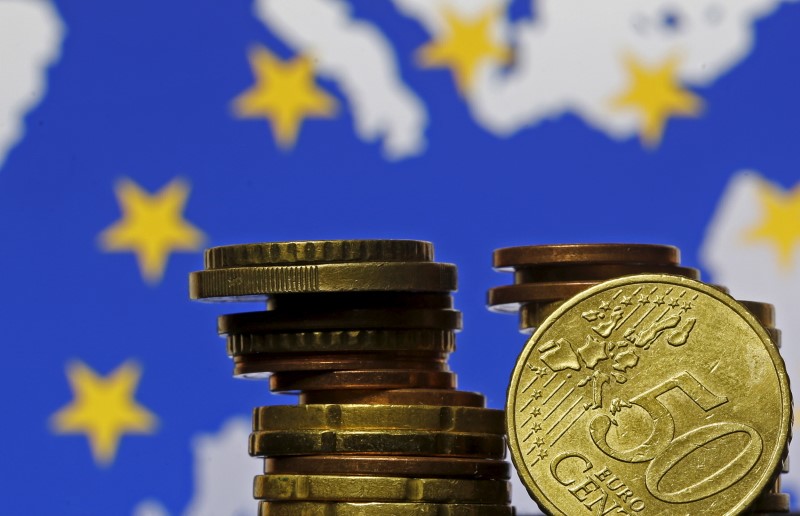By Ritvik Carvalho and Dhara Ranasinghe
LONDON (Reuters) - Euro zone investments have turned in one of their best years since the single currency was born in 1999, confounding many who had bet on the bloc to be the disaster play of 2017.
Euro zone "break up" trades as a top investment play for 2017 hardly seemed outlandish a year ago.
Brexit, fears of contagion from the near-collapse of Italy's oldest bank, and anxiety about a surge in populist anti-euro sentiment in a year packed with elections turned investors decidedly negative on the bloc's prospects.
But a dramatic swing in fortunes instead brought the fastest growth rate since the height of the sovereign debt crisis six years ago. Fears of anti-euro victories in French, German and Dutch elections proved wide of the mark, although inroads were made.
The brighter outlook and more stable politics has meantime allowed the European Central Bank to take its first gradual steps towards exiting the extraordinary monetary stimulus in place since 2015.
With the recovery even gaining its own Twitter hashtag -- #Euroboom" -- this set of graphics highlights the turnaround.
FASTEST GROWTH IN 6 YEARS
Euro zone posts fastest growth since 2011 - http://reut.rs/2h61zz9
Third quarter figures released last week showed the euro zone hit its fastest growth rate since 2011, when the euro-crisis escalated and dented growth. That run also puts it in the top third of fastest growing quarters the bloc has posted since the birth of the single currency in 1999. A report by ratings firm S&P Global suggests the recovery will remain broad-based.
SENTIMENT SURGE
Euro zone sentiment hits multi-year peaks - http://reut.rs/2h3RQt2
Investor and economic sentiment in the euro zone is close to record highs. Sentix's index of investor morale is at its highest level in 10 years. The European Commission's measure of economic sentiment for October hit its highest levels since the dot-com bubble in 2001, shrugging off jitters about an independence bid in the wealthy Spanish region of Catalonia.
RATINGS REVIVAL
Euro zone ratings outlook balance at highest in over 10 years - http://reut.rs/2z7uYzO
Ratings agency Fitch's outlook balance for the euro zone is at its highest since July 2005. The outlook balance is the difference between the total of the positive and negative outlooks on each country.
S&P Global unexpectedly lifted Italy's sovereign rating last month, the first such rise for the country by the firm in at least three decades. In September, S&P became the first of the big three ratings agencies to lift Portugal back to investment grade.
STOCKS, EURO SHINE
European assets on the rise - http://reut.rs/2hff5Am
The pan-European STOXX 600 index (STOXX) has risen to two-year highs as strong corporate earnings accompany the economic recovery. Overall 66 percent of companies in the MSCI Europe index have beaten or met earnings expectations for the third quarter of 2017, underpinning regional indexes' gains.
A surging euro
CREDIT WORTHY
Creditworthiness doubts ease - http://reut.rs/2h53dkH
The borrowing costs of those countries bailed out during the euro zone debt crisis continue to fall as investors regain confidence in the growth that reforms have produced.
TIGHTER LABOUR MARKETS
Euro zone labour market tightens - http://reut.rs/2z8aBml
Faster euro zone growth helped push unemployment to its lowest level in nine years in October, despite soft inflation. Wages also grew at their fastest rate in two years in the second quarter of 2017, an encouraging sign for the ECB looking to wind down monetary stimulus.
BANK WOES EASE
Euro zone lending rises, bad loans fall - http://reut.rs/2h6iTnr
While still high, the number of non-performing loans in proportion to output in the euro area has halved since the peak of the crisis. Lending growth to both households and businesses is on the rise, with loans to households growing at their highest rate since June 2011.

Efforts to address weakness in Italy's banking system have helped banking stocks in the country (FTIT8300) rise over 20 percent this year. The Bank of Italy said last month that insolvent loans held by Italian banks fell to a three-year low in August.